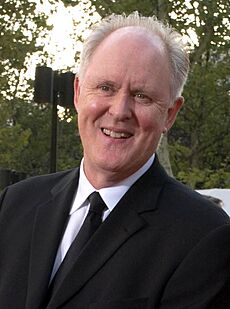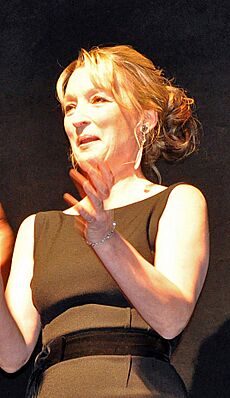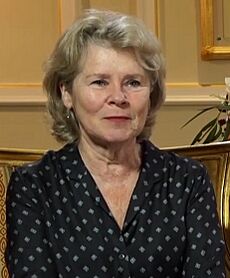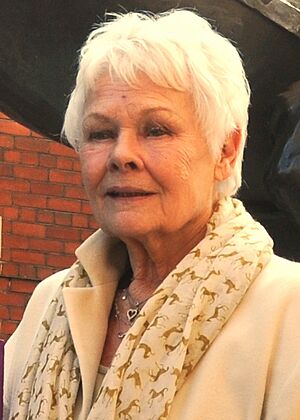Laurence Olivier Awards facts for kids
Quick facts for kids Olivier Awards |
|
|---|---|
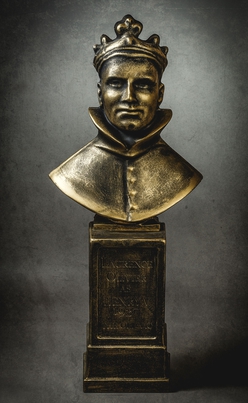
Laurence Olivier Award, designed by the sculptor Harry Franchetti, depicting Olivier as Henry V at The Old Vic in 1937
|
|
| Presented by | Society of London Theatre |
| Country | United Kingdom |
| First awarded | 1976 |
|
|||||||||||||||||||||||||
|
|||||||||||||||||||||||||
|
|||||||||||||||||||||||||
The Laurence Olivier Awards, often called The Olivier Awards, are special prizes given out every year. They celebrate the best professional theatre shows in London. The Society of London Theatre presents these awards.
The awards were first known as the Society of West End Theatre Awards. In 1984, they were renamed to honor the famous English actor Laurence Olivier. These awards are given to people involved in West End shows and other important London theatres. They cover many types of performances, including plays, musicals, dance, and opera.
There's also a special award given each year that isn't competitive. The Olivier Awards are known around the world as the top honor in British theatre. They are like the BAFTA Awards for movies and TV, or the BRIT Awards for music. They are also similar to the Tony Awards on Broadway in the USA.
Since they started, the Olivier Awards ceremonies have been held at different places in London. From 2012 to 2016, they were at the Royal Opera House. Since 2017, they have been held at the Royal Albert Hall. You can watch the awards on ITV1 and listen on Magic Radio.
Contents
History of the Olivier Awards
The Olivier Awards began in 1976. They were created by the Society of London Theatre. Back then, they were called the Society of West End Theatre Awards. The first ceremony took place in December 1976 at the Café Royal.
In 1984, the famous British actor Laurence Olivier agreed to have the awards named after him. That's when they became known as the Laurence Olivier Awards.
How Winners Are Chosen
Every year, special groups of judges are formed by the Society of London Theatre. These groups judge shows in theatre, opera, dance, and other categories.
For opera, dance, and other shows, the judging groups include both experts and members of the public. The experts are people like journalists and casting directors. The public members are people who love London theatre. These groups first pick the shows they think should be nominated. Then, they vote for the winners.
For the main theatre awards, a long list of possible nominees is made by public judges. This list is then sent to members of the Society of London Theatre to vote on. Their votes, along with the judges' votes, create the final list of nominees. After that, both the members and the judges vote again to choose the winners.
The Awards Ceremony
Who Hosts the Show?
Many famous people have hosted the Olivier Awards ceremony. Some past hosts include Michael Ball, Imelda Staunton, Clive Anderson, Stephen Mangan, Hugh Bonneville, Sheridan Smith, Lenny Henry, Catherine Tate, Jason Manford, and Hannah Waddingham.
Where the Awards Are Held
The Grosvenor House Hotel is a place often linked with the awards. It has hosted the after-show party many times and the main event a few times too. Other places where the awards have been held include the Albery Theatre, Café Royal, Dominion Theatre, London Palladium, Lyceum Theatre, Piccadilly Theatre, and Theatre Royal Drury Lane.
From 2012 to 2016, the ceremony was held at the Royal Opera House. Since 2017, it has been held at the Royal Albert Hall.
Watching the Awards
The first time the Laurence Olivier Awards were shown on TV was in 1981 on BBC1. This continued until 1992. Then, the awards moved to BBC2 until 2003.
After that, the awards were only broadcast on radio until 2011. In 2011 and 2012, the BBC offered live coverage online and on BBC Radio 2. Since 2013, ITV has broadcast the awards, bringing them back to mainstream television. You can also listen to the ceremony on Magic Radio.
Award Categories
The Olivier Awards celebrate many different parts of theatre. Here are some of the main categories:
Plays
- Best New Play
- Best Revival (for an older play brought back to the stage)
- Best Entertainment or Comedy Play
- Best Actor
- Best Actress
- Best Performance in a Supporting Role (for actors who support the main characters)
Musicals
- Best New Musical
- Best Musical Revival
- Best Actor in a Musical
- Best Actress in a Musical
- Best Performance in a Supporting Role in a Musical
- Outstanding Musical Contribution (for music, singing, or orchestra)
Behind the Scenes
- Best Director
- Best Theatre Choreographer (for dance moves)
- Best Set Design
- Best Costume Design
- Best Lighting Design
- Best Sound Design
Dance and Opera
- Best New Dance Production
- Best New Opera Production
- Outstanding Achievement in Dance
- Outstanding Achievement in Opera
Other Special Awards
- Special Award (for amazing contributions to theatre)
- Best Family Show
- Outstanding Achievement in an Affiliate Theatre (for smaller, non-West End theatres)
Award Highlights and Records
Here are some interesting facts and records about the Olivier Awards:
Top Productions
- The play Harry Potter and the Cursed Child won the most Olivier Awards ever in 2017, with nine awards, including Best New Play.
- For musicals, Sunset Boulevard (2024), Cabaret (2022), Hamilton (2018), and Matilda (2012) all share the record for most wins, each getting seven awards.
- The Curious Incident of the Dog in the Night-Time (2013) won seven Olivier Awards.
Top Individuals
- Sonia Friedman is the producer who has won the most Olivier Awards, with 18 wins. She is the only producer to have won Best Play, Best Musical, Best Play Revival, and Best Musical Revival.
- William Dudley (a designer), Judi Dench (an actress), and Matthew Bourne (a choreographer) are tied for the most competitive wins by an individual, each with seven awards. Judi Dench also received a Special Olivier Award in 2004.
- Andrew Lloyd Webber (a composer and producer) has won six competitive awards and a Special Olivier Award in 2008.
- Paule Constable has won six Oliviers and holds the record for the most Olivier nominations, with seventeen.
- Performers who have won Olivier Awards for both plays and musicals include Simon Russell Beale, Jonathan Pryce, Imelda Staunton, Judi Dench, and Eddie Redmayne.
- Of these, Judi Dench is the only one to win both a play and a musical acting award in the same year (1996).
- In 1991, Karla Burns was the first black performer to win an Olivier Award for her role in Show Boat.
- Imelda Staunton has won the Olivier for Best Actress in a Musical four times. She also has the most nominations in that category, with eight.
- In 1985, Patti LuPone won an Olivier for two different performances in the same year: in Les Miserables and The Cradle Will Rock.
- In 2022, all seven actors who shared the role of the Tiger in Life of Pi won the Olivier for Best Actor in a Supporting Role.
- In 2012, all four actresses who shared the role of Matilda in Matilda the Musical won the Olivier for Best Actress in a Musical.
- In 2006, all three actors who shared the role of Billy Elliot in Billy Elliot the Musical won the Olivier for Best Actor in a Musical.
- On April 15, 2012, at just 10 years old, Eleanor Worthington Cox became the youngest winner of an Olivier Award. She won Best Actress in a Musical for Matilda the Musical.
- In 2018, Billie Piper became the first actor to win all six major UK Theatre Best Actress awards for a single performance in Yerma.
See also
 In Spanish: Premio Laurence Olivier para niños
In Spanish: Premio Laurence Olivier para niños
- Ian Charleson Awards
- Evening Standard Theatre Awards
- WhatsOnStage Awards
- Tony Awards
 | William Lucy |
 | Charles Hayes |
 | Cleveland Robinson |


